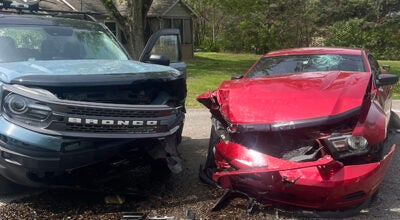‘I’m familiar with counties’
Published 7:21 pm Sunday, February 13, 2011
CASSOPOLIS — Former Upper Peninsula English teacher David Benda has now been in county government for 26 years, including Clinton County administrator and Midland County administrator.
While working on his master’s degree at Michigan State University (the Detroit area native attended Central Michigan University in the mid- to late-1970s for his undergraduate degree), Benda took a budget analyst job with Ingham County, where he met the man who was president of the company he worked for most recently.
Benda became Ingham County budget director for 11 years, Clinton County administrator for six years and Midland County administrator and controller through 2009.
For 10 months he headed Public Employee Benefits Solutions (PEBS), which is the insurance agent for Cass County.
He left there on Aug. 20 to return to county government.
“I’m familiar with counties,” Benda explained his interest in Cass County’s position. “Clinton County is very similar to Cass County. Its proximity to Lansing is similar to your proximity to South Bend. (Cass County) is kind of a vacationland area and I’m not getting any younger, so I plan on finding a place to retire soon. Coming to Cass County, I’ll be back in county government, which I’ve done for a long time and what I like to do. I’m fairly good at it. Folks look to me for answers. Some of the things you’ve passed, I wrote. Cass County’s not a magic county to me, but it’s the right size and the right kind.”
Benda said merging or consolidating services would mean taking a leadership role.
“You’re going to need to initiate a dialogue with a lot of different people,” he said. “For example, before I left Midland we were in meetings that occurred over the course of about a year and half. I left before we got too far into consolidation, but we had the intermediate school district, superintendent of schools, the city manager, myself and we and our staffs hired a facilitator we got foundations to pay for and sat at a table to look at consolidating all kinds of services,” from payroll processing to fuel purchases.
“It can be done,” he said, “but it’s a process because there can be obstacles, such as state law and union contracts. You can’t reduce anyone’s wages or benefits and the lower-paid groups aren’t the benchmark, it’s the higher-paid group.”
“If there’s something you don’t like, I want to hear about it right away,” Benda said. “I’ve hired a lot of people and am batting close to 1.000 on hiring good people. Part of the trick is to ask them the right questions.”
Benda said of his leadership style, “We’re all in the same boat, we’re all floating along on the same raft. Elected officials, I’ve had wonderful relations with. They’re friends. It’s just a matter of treating them with respect and respect for their constitutional mandates and for what they do. We’re here to try to deliver services as efficiently as possible. To a person, you find they agree with that and we’re on the same page. Communication is key to all of it. As far as leadership goes, people have to trust that you know what you’re doing, that your knowledge, your skills, your abilities are adequate for the job. Then you have to have a vision, which proceeds, in part, from the commissioners and from the public. What’s next on your list? Better public transportation? Better public health services? Whatever. Once you find that direction, you find ways to get there because it’s a matter of allocating resources. Elected officials want the same things, but they’re in competition for those dollars. Sometimes, law enforcement is more important than health services. That’s a guns and butter type of argument. You’re never going to get perfect agreement — especially with people who are vested in programs, so you’ve got to treat each other with respect while you have that dialogue. As far as managing the organization, you have to know what resources are available and manage them wisely. All people within departments have something to contribute. By bringing everyone together, having meetings — I used to sit down weekly with my department heads and go over things. They bring you what’s going on in their areas, you get to give them direction, then you get to bring it to commissioners once a month and say, ‘Here’s what’s going on throughout the organization.’ It’s all about communication. They feel good about getting what they’re doing in front of commissioners. The public gets to hear about it. In Midland, there’s a daily press and televised meetings. It would be pretty hard to hide anything. Before you can lead, you have to gain everyone’s trust.”






